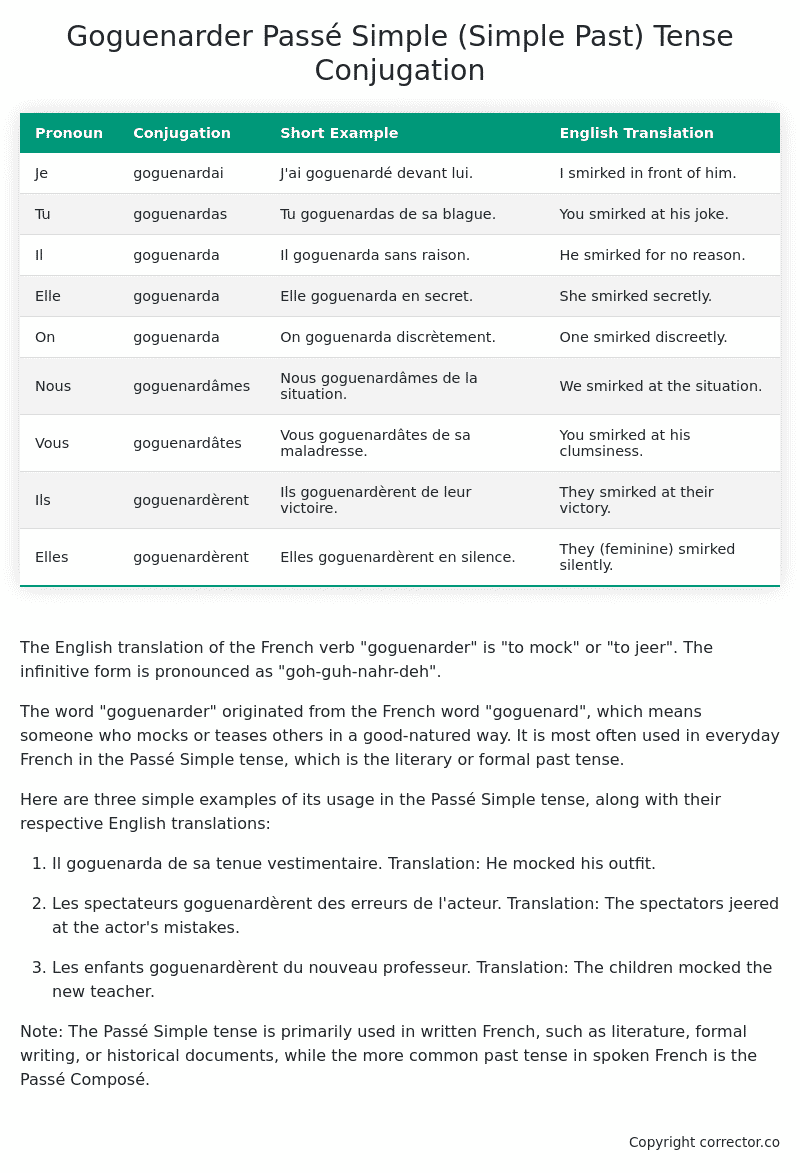Passé Simple (Simple Past) Tense Conjugation of the French Verb goguenarder
Introduction to the verb goguenarder
The English translation of the French verb “goguenarder” is “to mock” or “to jeer”. The infinitive form is pronounced as “goh-guh-nahr-deh”.
The word “goguenarder” originated from the French word “goguenard”, which means someone who mocks or teases others in a good-natured way. It is most often used in everyday French in the Passé Simple tense, which is the literary or formal past tense.
Here are three simple examples of its usage in the Passé Simple tense, along with their respective English translations:
-
Il goguenarda de sa tenue vestimentaire.
Translation: He mocked his outfit. -
Les spectateurs goguenardèrent des erreurs de l’acteur.
Translation: The spectators jeered at the actor’s mistakes. -
Les enfants goguenardèrent du nouveau professeur.
Translation: The children mocked the new teacher.
Note: The Passé Simple tense is primarily used in written French, such as literature, formal writing, or historical documents, while the more common past tense in spoken French is the Passé Composé.
Table of the Passé Simple (Simple Past) Tense Conjugation of goguenarder
| Pronoun | Conjugation | Short Example | English Translation |
|---|---|---|---|
| Je | goguenardai | J’ai goguenardé devant lui. | I smirked in front of him. |
| Tu | goguenardas | Tu goguenardas de sa blague. | You smirked at his joke. |
| Il | goguenarda | Il goguenarda sans raison. | He smirked for no reason. |
| Elle | goguenarda | Elle goguenarda en secret. | She smirked secretly. |
| On | goguenarda | On goguenarda discrètement. | One smirked discreetly. |
| Nous | goguenardâmes | Nous goguenardâmes de la situation. | We smirked at the situation. |
| Vous | goguenardâtes | Vous goguenardâtes de sa maladresse. | You smirked at his clumsiness. |
| Ils | goguenardèrent | Ils goguenardèrent de leur victoire. | They smirked at their victory. |
| Elles | goguenardèrent | Elles goguenardèrent en silence. | They (feminine) smirked silently. |
Other Conjugations for Goguenarder.
Le Present (Present Tense) Conjugation of the French Verb goguenarder
Imparfait (Imperfect) Tense Conjugation of the French Verb goguenarder
Passé Simple (Simple Past) Tense Conjugation of the French Verb goguenarder (You’re reading it right now!)
Passé Composé (Present Perfect) Tense Conjugation of the French Verb goguenarder
Futur Simple (Simple Future) Tense Conjugation of the French Verb goguenarder
Futur Proche (Near Future) Tense Conjugation of the French Verb goguenarder
Plus-que-parfait (Pluperfect) Tense Conjugation of the French Verb goguenarder
Passé Antérieur (Past Anterior) Tense Conjugation of the French Verb goguenarder
Futur Antérieur (Future Anterior) Tense Conjugation of the French Verb goguenarder
Subjonctif Présent (Subjunctive Present) Tense Conjugation of the French Verb goguenarder
Subjonctif Passé (Subjunctive Past) Tense Conjugation of the French Verb goguenarder
Subjonctif Imparfait (Subjunctive Imperfect) Tense Conjugation of the French Verb goguenarder
Conditionnel Présent (Conditional Present) Tense Conjugation of the French Verb goguenarder
Conditionnel Passé (Conditional Past) Tense Conjugation of the French Verb goguenarder
Conditionnel Passé II (Conditional Past II) Tense Conjugation of the French Verb goguenarder
L’impératif Présent (Imperative Present) Tense Conjugation of the French Verb goguenarder
L’impératif Passé (Imperative Past) Tense Conjugation of the French Verb goguenarder
L’infinitif Présent (Infinitive Present) Tense Conjugation of the French Verb goguenarder
L’infinitif Passé (Infinitive Past) Tense Conjugation of the French Verb goguenarder
Le Participe Présent (Present Participle) Tense Conjugation of the French Verb goguenarder
Le Participe Passé (Past Participle) Tense Conjugation of the French Verb goguenarder
Struggling with French verbs or the language in general? Why not use our free French Grammar Checker – no registration required!
Get a FREE Download Study Sheet of this Conjugation 🔥
Simply right click the image below, click “save image” and get your free reference for the goguenarder Passé Simple tense conjugation!

Goguenarder – About the French Passé Simple (Simple Past) Tense
Formation
Usage
Narration
Historical Context
Interactions with other tenses
Passé Composé
Imparfait
Conditional and Subjunctive
Summary
I hope you enjoyed this article on the verb goguenarder. Still in a learning mood? Check out another TOTALLY random French verb conjugation!


